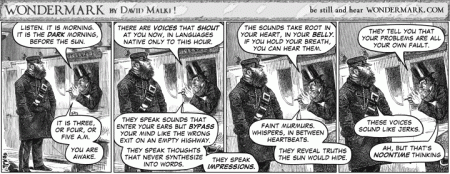There’s only a little bit of language stuff in this posting, which is mostly in the Gayland category, about the representation of men and male-male relationships (especially, men’s bodies and man-man sex) in material intended for (and/or appreciated by) a gay male audience.
Some of my Gayland essays are in my voice; these are “academic” in tone, despite their subject and (sometimes) their language. But others (the Collage Essays) speak in another voice, that of an alter ego (call me Alex), and are keyed to two sets of images: images in “male art” (including photography, film, and video as well as painting, drawing, etc.), gay porn, ads (for mass market audiences or specifically aimed at gay men), and so on; and the collages I make from such items as raw material.
(Most of this visual material is definitely on the wrong side of the displayable-in-public line, so I can’t show it to you here.)
In the collage essays, Alex’s talk shifts back and forth between (on the one hand) displaying his body and his sexual desires, attitudes, and activities, and (on the other) viewing other men’s bodies and so on in erotic terms — between giving and receiving, or offering (himself) and desiring (another), or in the terms of commercial transactions, between purveying and consuming, or selling and buying, or hustler and john. Take it! / Let me have it!
(I posted one of the collage essays in my piece on shirt-lifing a while back.)
This duality in the way sexuality is configured psychologically is pretty much built into the condition of gay men, and I have simply let Alex embody the duality. (Alex is inclined to give advice to his gay readers, by the way. He fancies himself as a jazzed-up Dan Savage, and he thinks he’s cuter and hotter than Dan, but, frankly, I think he’s deceiving himself.)
This particular set of collage essays is in the Offering Your Body series, under Displaying Your Equipment, in four installments — The Basket, Peekaboo, The Hard Dick, Sweet Cock — moving from (ostentatious) concealment to display, much as with the avoidance vs. open use of taboo vocabulary.
(This material was essentially completed while I was at the Stanford Humanities Center in 2005-06. The Center was hospitable enough to sponsor (in November 2005, on the occasion of a visit from Linda Williams of Berkeley) an exhibition of my XXX-rated collages, plus some raw materials that I was working with at the time and drafts of some of these collage essays. However, the Center is not directly responsible for any of this stuff, and it certainly didn’t pay me to do it, just gave me a free space in my life to play with a project in addition to the one they were paying me for, on the advice literature on English grammar, usage, and style.)
And now I turn to microphone over to Alex.
(more…)

